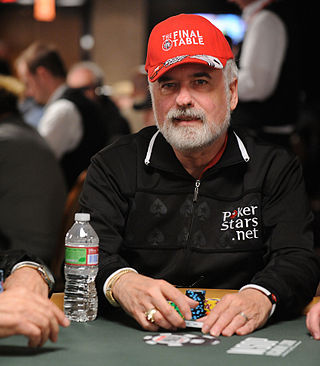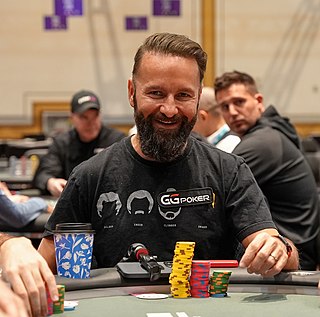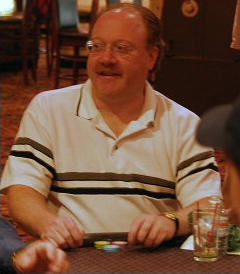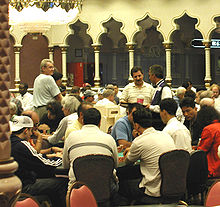
Poker is a family of comparing card games in which players wager over which hand is best according to that specific game's rules. It is played worldwide, but in some places the rules may vary. While the earliest known form of the game was played with just 20 cards, today it is usually played with a standard deck, although in countries where short packs are common, it may be played with 32, 40 or 48 cards. Thus poker games vary in deck configuration, the number of cards in play, the number dealt face up or face down, and the number shared by all players, but all have rules that involve one or more rounds of betting.

The World Series of Poker (WSOP) is a series of poker tournaments held annually in Paradise, Nevada and, since 2004, sponsored by Caesars Entertainment. It dates its origins to 1970, when Benny Binion invited seven of the best-known poker players to the Horseshoe Casino for a single tournament, with a set start and stop time, and a winner determined by a secret ballot of the seven players.

Texas hold 'em is one of the most popular variants of the card game of poker. Two cards, known as hole cards, are dealt face down to each player, and then five community cards are dealt face up in three stages. The stages consist of a series of three cards, later an additional single card, and a final card. Each player seeks the best five-card poker hand from any combination of the seven cards: the five community cards and their two hole cards. Players have betting options to check, call, raise, or fold. Rounds of betting take place before the flop is dealt and after each subsequent deal. The player who has the best hand and has not folded by the end of all betting rounds wins all of the money bet for the hand, known as the pot. In certain situations, a "split pot" or "tie" can occur when two players have hands of equivalent value. This is also called "chop the pot". Texas hold 'em is also the H game featured in HORSE and HOSE.

A poker tournament is a tournament where players compete by playing poker. It can feature as few as two players playing on a single table, and as many as tens of thousands of players playing on thousands of tables. The winner of the tournament is usually the person who wins every poker chip in the game and the others are awarded places based on the time of their elimination. To facilitate this, in most tournaments, blinds rise over the duration of the tournament. Unlike in a ring game, a player's chips in a tournament cannot be cashed out for money and serve only to determine the player's placing.

Phillip Jerome Hellmuth Jr. is an American professional poker player who has won a record seventeen World Series of Poker bracelets. He is the winner of the Main Event of the 1989 World Series of Poker (WSOP) and the Main Event of the 2012 World Series of Poker Europe (WSOPE), and he is a 2007 inductee of the WSOP's Poker Hall of Fame. He is widely regarded as one of the greatest tournament players of all time.

Thomas K. McEvoy is a professional poker player, author and member of the Poker Hall of Fame, 2013 inductee. He is best known for winning the 1983 World Series of Poker Main Event.

Walter Clyde "Puggy" Pearson was an American professional poker player. He is best known as the 1973 World Series of Poker Main Event winner.

Daniel Negreanu is a Canadian professional poker player who has won six World Series of Poker (WSOP) bracelets and two World Poker Tour (WPT) championship titles. In 2014, independent poker ranking service Global Poker Index recognized Negreanu as the best poker player of the previous decade.

Bon "John" Phan is a Vietnamese-American professional poker player based in Stockton, California, who is a two-time World Series of Poker bracelet winner and is a winner and four-time final tablist of World Poker Tour Championships.

Jeffrey Lisandro is an Italo-Australian professional poker player, now residing in Salerno, Italy.

Ram "Crazy Horse" Vaswani a former professional poker player and the youngest member of The Hendon Mob, a group of professional poker players. He resides in Finchley with his wife Jackie and daughter Hollie.

Commerce Casino is a cardroom located in the Los Angeles suburb of Commerce. With over 240 tables on site, Commerce Casino is the largest cardroom in the world. Established in 1983, the casino accounted for 38% of Commerce's tax revenues for the 2006-2007 fiscal year. As of 2016, the casino was providing $22 million a year in licensing fees to the city.

Russell Aaron Boyd, commonly known as Dutch Boyd, is an American professional poker player from Culver City, California.
Robert Turner is an American professional poker player based in Downey, California.

Joe Awada is a professional poker player, based in Las Vegas, Nevada.

The World Series of Poker Europe (WSOPE) is the first expansion effort of World Series of Poker-branded poker tournaments outside the United States. Since 1970, participants had to travel to Las Vegas if they wanted to compete in the World Series of Poker (WSOP). Although the WSOP held circuit events in other locations, the main tournaments, which awarded bracelets to the winners, were exclusively held in Las Vegas. The inaugural WSOPE, held in 2007, marked the first time that a WSOP bracelet was awarded outside Las Vegas. From its inception to the 2013 tournament, players from 19 countries — USA (10), France (4), UK (3), Denmark (3), Canada (2), Norway (2), Portugal (2), Italy (2), Afghanistan, Germany, Indonesia, Spain, New Zealand, Sweden, Tunisia, Switzerland, Australia, Italy and Finland — have won bracelets.

Phuong "Kenny" Tran is a Vietnamese American professional poker player from Arcadia, California who won the 2008 World Series of Poker $10,000 Heads-Up No-Limit Hold'em World Championship. Tran was born in Vietnam and gives 10% of his winnings to his extended family there. He is married and has 3 children. He first began playing poker in 1992 at a bowling alley while working at McDonald's.

Daniel Heimiller is an American professional poker player who won the Limit Hold'em & Seven-Card Stud event at the 2002 World Series of Poker and the Seniors No-Limit Hold'em Championship in 2014. He has at least one WSOP cash for 25 consecutive years (1997-2021). He is ranked 5th in all time number of live tournament cashes and 12th in all time number of WSOP cashes.

Shaun Frank Deeb is an American professional poker player from Troy, New York. He has three World Championship of Online Poker (WCOOP) player of the year titles and six World Series of Poker (WSOP) bracelets.
The 2019 World Series of Poker was the 50th annual tournament, and took place from May 28 – July 16, 2019 at the Rio All-Suite Hotel & Casino in Las Vegas, Nevada.


















